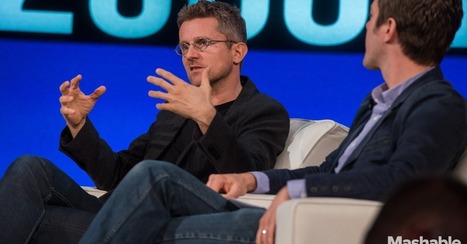How can countries, cities and organizations balance the need to gather and analyze big data with Internet freedom and privacy?
Research and publish the best content.
Get Started for FREE
Sign up with Facebook Sign up with X
I don't have a Facebook or a X account
Already have an account: Login
 Your new post is loading... Your new post is loading...
 Your new post is loading... Your new post is loading...
|
|






![How to Make the Most of Big Data [Infographic] | Creative_me | Scoop.it](https://img.scoop.it/rMM4-Cdz_nin8tvtKzd3STl72eJkfbmt4t8yenImKBVvK0kTmF0xjctABnaLJIm9)





As the world keeps going online, with more and more people getting connected, there's more and more data available to be mined. And this large datasets of so called big data can be mined to inform decisions and policies for social good.
However, these datasets are so large that they create significant challenges for the organizations and governments handling them. One of those key challenges is privacy. In a world that is now more concerned about privacy than ever, after the revelations of top secret NSA surveillance programs, using big data comes with the risk of violating individual's rights.
SEE ALSO: Teen Cancer Researcher: 'Science Shouldn't Be a Luxury'
"When you digitize things, then the way you interface with it is different, you create a world of total recall, a world where it's impossible to forget," Carlo Ratti, an architect who directs theMIT Senseable City Lab, said during a panel on big data and Internet freedom at the 2013 Social Good Summit on Tuesday.
Robert Kirkpatrick, the director of the U.N.'s Global Pulse, an initiative that uses big data to harness the most important issues in the developing world and inform humanitarian policies, agrees that any big data project needs to be aware of the risks of indiscriminately collected data.
"At the U.N. we see big data as the greatest opportunity for relief and development that the world has ever seen," he said in a roundtable press conference following the panel. "Unless you fail to protect privacy and process, in which case is the greatest threat to human rights."
For the U.N., big data, say that of data-mined Twitter posts from a certain country, can provide a snapshot of a rise in unemployment, a disease outbreak or a spike in food prices. These are what Kirkparick calls "digital smoke signals of distress."
Those tweets, coupled with data from cellphone carriers, can localize the problems and help humanitarian organizations develop and deploy solutions faster.
But data like that can be identifiable and misused.
You can text-mine everybody's email in the world, and you can know when they're getting sick, and when they get in trouble, but the risk of abuse and the violation of trust is something that makes that impossible," Kirkpatrick said.
That's why Global Pulse has "privacy and data protection principles" that guide how the organization gathers and uses data. According to them, Global Pulse doesn't collect data containing personally identifiable information, doesn't access private communications and only uses lawfully obtained data, among other safeguards.
The need to follow principles like these in gathering data will be ever more increasing as big data gets, well, bigger.
The Ericsson Group estimates that by 2018, 1 billion people will have smartphones, and each of them will produce an average of 2 gigabytes per day, said Elaine Weidman-Grunewald, the group's Vice President of Sustainability and Corporate Responsibility.
"There is endless possibilities on how to use the data for social good," she said during the panel.
With that goal in mind, Kirkpatrick thinks the U.N. can be a platform to discuss how to use big data for social good and respect privacy and citizens' rights. For that, the U.N. will need industries, like the mobile and financial services, to figure out ways to share data safely, he said.
That will be a necessary step for a world in which big data can have a real impact.
"We'd like to get to a world where real time information on human well being is ambient, it's all around us like weather data is right now," Kirkpatrick said. "A world in which you could see what's happening right now in employment or health, get real time forecasting for a certain period ahead, and get alerts if people start to run out of money or food. We think that's possible but it's going to take a lot of partnerships to get there."
About Social Good SummitThe Social Good Summit is where big ideas meet new media to create innovative solutions and is brought to you by Mashable, The 92nd Street Y, The United Nations Foundation, The United Nations Development Programme, The Bill and Melinda Gates Foundation and Ericsson. Held during U.N. Week, the Social Good Summit unites a dynamic community of global leaders to discuss a big idea: the power of innovative thinking and technology to solve our greatest challenges.
Date: Sept. 22 through Sept. 24
About EricssonTime: 12 to 6 p.m. each day
Location: 92nd Street Y, 1395 Lexington Ave., New York, N.Y.
Tickets are sold-out, but tune into the Livestream.
Ericsson is a world-leading provider of communications technology and services. We are enabling the Networked Society with efficient real-time solutions that allow us all to study, work and live our lives more freely, in sustainable societies around the world. Ericsson is the leading advocate of Technology for Good. By using broadband, cloud and mobility to address climate change, poverty, education, health, human rights, and humanitarian issues such as refugees, peace and disaster response, we work to ensure that our technology is a force for good and lasting change.
BONUS: 10 Moving Quotes From Day 2 of Social Good Summit
Social Good Summit Day 2 OPEN GALLERY1. Al Gore, Former Vice President"It's absolutely absurd to treat the sky as if it were an open sewer."
Show As ListImage: Mashable, Casey Kelbaugh